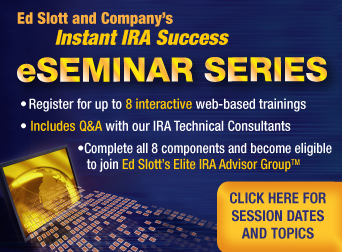
- Ed as a Speaker
- Ed Slott's IRA Advisor Newsletter
- Shopping Cart
- Discussion Forum
- IRA Resources
- IRA and Tax Tables
Assistance
Restarting RMDs in 2010 — THEY'RE BACK!
|
The April issue of Ed Slott's IRA Advisor Newsletter goes into detail about the return of RMDs in 2010. The Worker, Retiree, and Employment Recovery Act (WRERA) of 2008 included a temporary suspension of RMDs for both IRAs and defined contribution plans in 2009. However, WRERA left many questions on what RMDs must be taken in 2010 and how those withdrawals will be calculated. It is important for all clients to take the RMD for 2010 as any RMDs not taken are subject to the 50% penalty. For a more detailed analysis of this subject, check out the April issue of the newsletter. |

|
Inside Ed Slott's IRA Advisor NewsletterRestarting RMDs in 2010
Court Denies 10% Penalty Exception for IRS Levy
Guest IRA Expert
Roth IRA Conversions:
If you are not already an Ed Slott's IRA Advisor Newsletter subscriber, you can preview past issues before subscribing. |
|

Q: Under what circumstances is an inherited Roth IRA subject to estate taxes if it's left to beneficiaries? Is the Roth considered part of the taxable estate, or does it escape estate tax altogether? Or does the answer depend on certain circumstances? What is the best answer, and why does there seem to be a lot of inconsistency about this matter? A: An inherited Roth IRA is always part of the taxable estate. While distributions from the inherited Roth account are income tax-free, they are NOT estate tax-free if the overall estate is subject to estate tax. The federal estate tax has been eliminated, so far, for 2010. |
||
|
|||








